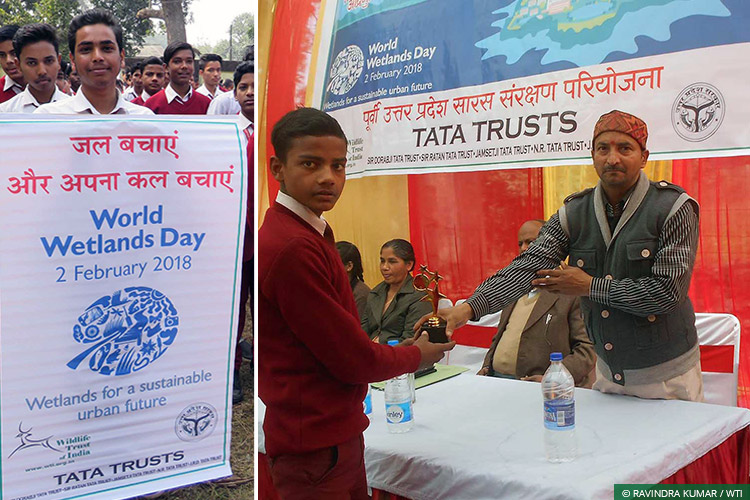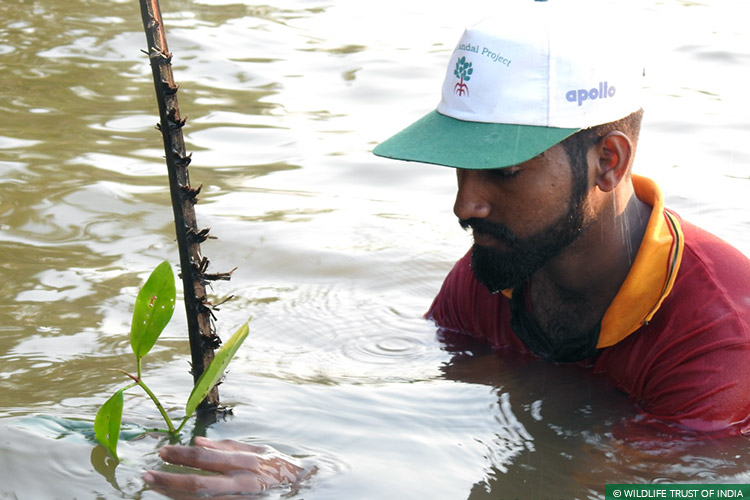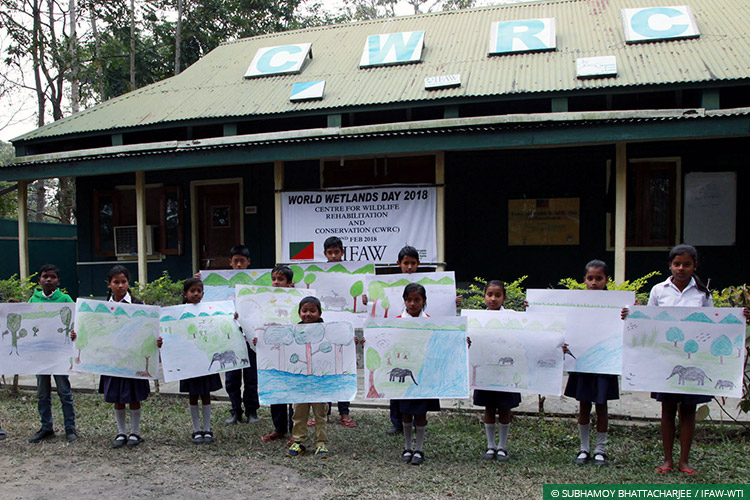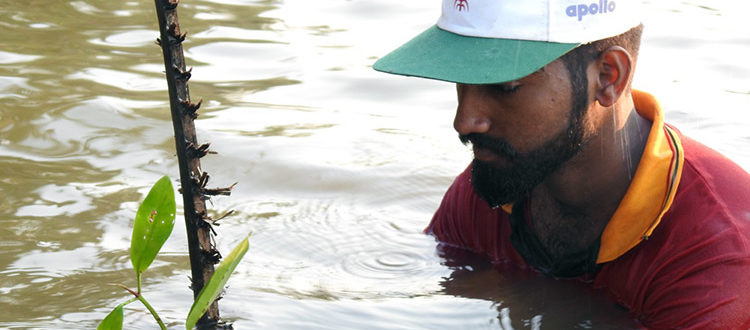From Panbari to Nichlaul to Kunhimangalam, WTI Celebrates World Wetlands Day with Students
February 5, 2018: On World Wetlands Day, celebrated annually on February 2 mark the signing of the Ramsar Convention on wetlands in 1971, we organised events to restore and spread awareness about wetland habitats across projects in Assam, Uttar Pradesh and Kerala.

SARUS CRANE CONSERVATION PROJECT, EASTERN UTTAR PRADESH
In the Maharajganj district of eastern Uttar Pradesh, WTI and the Maharajganj Forest Division of the UP Forest Department celebrated World Wetlands Day with students of the Masih Sevashram High School, Nichlaul.
On January 31, in the lead up to World Wetlands Day, a quiz competition on environmental science was conducted at the high school for 350 students from standards 7 to 9. Thirty students won prizes while another 48 were selected for encouragement awards for good performance. These students then participated in a road show on February 2, marching from the Nichlaul Forest Range Campus to the Baidauli Wetland Site, one of the 27 Important Sarus Wetland Sites that WTI has identified across 10 districts of eastern UP.
The students sighted adult and juvenile sarus cranes as well as other wetland fauna and flora at Baidauli. Mr Ashok Chandra, Range Forest Officer, Nichlaul, briefed the students about the importance of wetlands for a sustainable future. The students then returned to the Forest Range Campus where the winners of the quiz competition were given trophies while the encouragement award winners were given medals. The event was graced by the RFO Mr Chandra; Mr Vikash Kumar, Mr Choubey, Sister Reena, Ms Kavita (Assistant Teachers with the Masih Sevashram High School); and Mr Arshad Hussain and Mr Subrat Kumar Behera (Assistant Managers at WTI).
WTI has run the Sarus Crane Conservation Project in eastern UP with support from Tata Trusts and the UP Forest Department since 2013. The project works through local volunteers (called ‘Sarus Mitra’ or Friends of the Sarus), Tata Trust partner NGOs, and Sarus Protection Committees (SPCs) formed from village communities that have, without financial inducement, stepped forward to conserve the iconic sarus crane and the wetlands that sustain it.

KANNUR KANDAL (MANGROVE RESTORATION) PROJECT, KERALA
The Kannur Kandal Project team celebrated World Wetlands Day by planting mangrove saplings in the Pullankote backwaters of the Perumba River in Kunhimangalam. The afforestation activity was conducted with volunteers National Service Scheme (NSS) unit of Payyanur College.
Kerala has lost most of its mangrove cover over the last few decades – down to just 17.5 sq km from 700 sq km. What is worrying is that 80 percent of mangrove habitat in the state is under private ownership and the legal protection to these habitats is meagre. The Kannur Kandal Project, run by WTI in partnership with Apollo Tyres, is based in Kunhimangalam village, one of the largest mangrove villages of Kerala. Land secured with the support of the international NGO World Land Trust has been used to establish a Mangrove Interpretation Centre, located in the natural ecosystem, for mangrove-based research and education. A mangrove nursery has been also established where 10 endemic mangrove species are cultivated and made available for community-based afforestation initiatives. Mangrove restoration activities have thus far been conducted on the Kavvayi River, the Valapattanam River and the Perumba River.

CWRC, KAZIRANGA, ASSAM
At the Centre for Wildlife Rehabilitation and Conservation (CWRC), the wildlife rescue, treatment and rehabilitation facility run by WTI, the International Fund of Animal Welfare (IFAW) and the Assam Forest Department, interactive sessions on the wetlands of northeast India were organised on February 2. Twelve students from standards 6 to 8 of the Panbari Scheduled Caste & Tribe Middle English School participated in these events, along with their Headmistress Ms Nirupama Hazarika and Assistant Teacher Ms Manika Baruah.
In the first session, Mr Arif Hussain, a conservationist and resource person from Aaranyak, a well-known conservation NGO, made an audiovisual presentation on wetland habitats and issues related with their conservation. WTI’s Communications Manager Mr Subhamoy Bhattaacharjee also made a presentation on the importance of wetlands from an anthropogenic perspective. Dr Panjit Basumatary, Dr Samshul Ali and Mr Sunil Kumar Sisodia of IFAW-WTI also participated in the event.
In the second session titled “Wetlands through the Eyes of Children”, the students were provided painting materials to express their understanding of wetlands in their immediate environment. The paintings will be displayed at their school so that other students are inspired to become more aware of wetlands and their importance.









